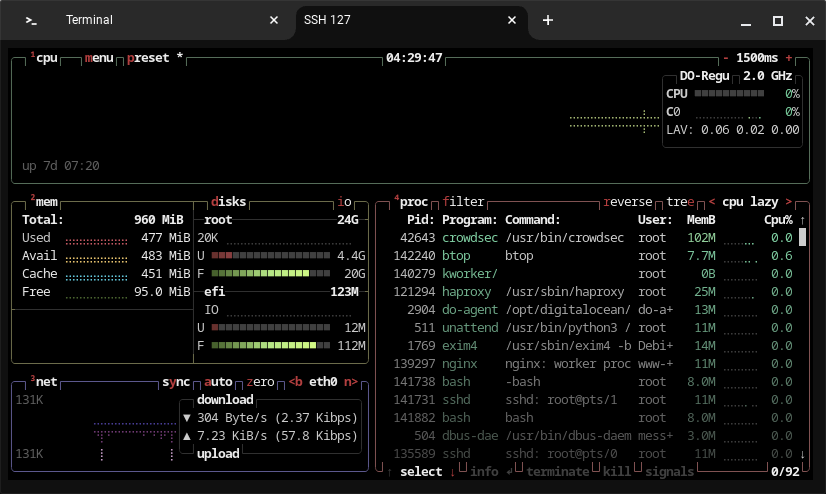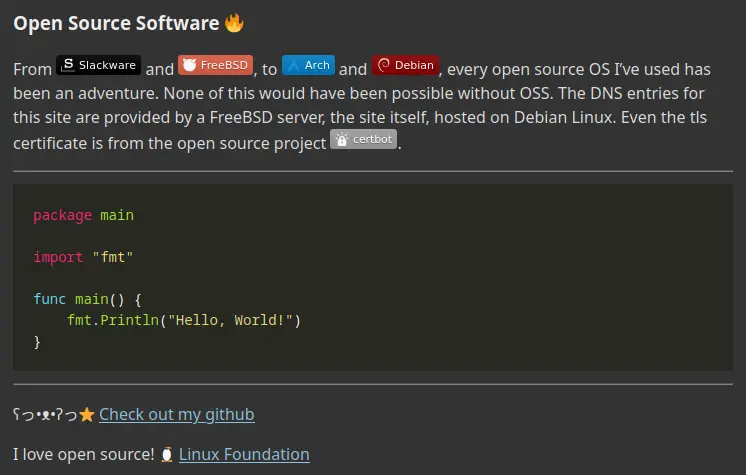- 3 Posts
- 45 Comments
Mine is a 2020 with 32gb storage and 3gb ram but same ballpark. I just replaced my PC earlier this year but the Chromebook is next. I’m looking at renewed HP elitebooks or renewed ThinkPads, but I’m not sure either come in a size OP would want.
Came to second this. I have an old hp Chromebook that is indestructible, has insane battery life, and still has a few years of updates left. The built in Linux terminal is fine and just about anything you can get through apt-get, dpkg, or otherwise works fine as well (if there is an arm version), it’ll even add menu entries for GUI apps.
I do light reading or dev work on it, and use the built in terminal to keep track of and ssh into my remote boxes. I take it on the road to take notes or hop on a wifi.
When I first got it the interface was kinda crap for a laptop, but through the updates (dark mode, new menu, etc) it’s actually just fine now.
It’s slow, low ram and only usable for a few tabs at a time, but for what I use it for it does fine, and it was cheap enough I won’t cry if it dies.

 5·3 months ago
5·3 months agoI dual booted a few times back in the days of winxp and win7. Never had a good experience somehow windows or a grub update always messed up things. Haven’t ran windows in years but when I have to it goes on a separate drive now.
I’m going to say yes as I sit here wearing a fedora tank top.

 13·3 months ago
13·3 months agoYou can import CSV files directly into an SQLite database. Then you are free to do whatever sql searches or manipulations you want. Python and golang both have great SQLite libraries from personal experience, but I’d be surprised if there is any language that doesn’t have a decent one.
If you are running Linux most distros have an SQLite gui browser in the repos that is pretty powerful.

 0·3 months ago
0·3 months agoHey thanks I’m sure they will be!
I’ve been coding around 25 years and got my start in perl. I absolutely hated python when I first used it. I use it all the time now. I still prefer my curly braces but I don’t have any trouble with python or mind the whitespace anymore. I just run it through ruff every save. I do the same with go everything goes through gofumpt. I really think a lot of it is a generational thing. Older people are just used to curly brackets.
I do get peoples complaints about the packaging. Unless you’re a dev already it’s a bit extra to deal with shuffling virtual environments because the system python environments almost never work out of the box, at least in the last few distros I’ve used. Once I adjusted though it’s no problem. I run half my dev stuff in toolboxes with their own environment anyway.

 0·3 months ago
0·3 months agoAwesome thanks!

 0·3 months ago
0·3 months agoI wasn’t aware of the Github pages being free that’s neat. It is fully static (running on nginx but generated with hugo) and I use freedns.afraid.org for the domains. Good to know thanks for the tip :)

 0·3 months ago
0·3 months agoThanks for the tip I’ll definitely take a look! That’s not bad at all and I prefer yearly payments.

 0·3 months ago
0·3 months agoThat’s not bad at all gonna have to check it out. I host my site on digital ocean it’s on the smallest single core 1gb ram droplet. I run crowdsec and nginx and a couple other little things and it sits around 40% ram usage. Costs 6$ a month and I added 4 weeks worth of automatic weekly backups for $1.50 a month.
I can deal with $7.50 for a little static web server.
They do offer a free $200/60 day credit if you get in with one of the free Linux Foundation cloud classes which is plenty to play with.
Just came here to say you could always look for alternative projects that have this built in as well. I’m not sure what logs you as looking at, but it might be best to contribute or request this feature directly for the software.
For example I use crowdsec and they have a button on the logs pages that will anonymize the entire page and is great for taking screenshots.
I agree with another poster that getting something to work with a number of different logs would be a huge undertaking and unrealistic for most solo devs. I do think asking whatever project could be a start. I’d love if journalctl and syslogd etc had a flag to anonymize the log output.
Personally often times I just open the screenshot in gimp and pixelate out the areas I want hidden, but that’s not an automated solution.
I second this. I run fedora on my desktop and debian on the server. Docker works great on debian as well.

 1·3 months ago
1·3 months agoThanks that’s good to learn!

 13·4 months ago
13·4 months agoMy main OS (debian) ssd started throwing Io errors this Friday night and I had to work Saturday, only image I had laying around was Fedora Kinoite. So that’s what I’m running until I order a new drive. I’m getting my wife a new laptop soon and was considered silverblue (she’s a Mac user but very quick with tech in general).
Anyway after using it a few days, I think when I get my new drive I might just go ahead and put Kinoite on it. I’m used to running my dev stuff in containers anyway and toolbox makes it super easy. Rpm-ostree is a breeze (though it takes a minute to build on this ancient USB hdd, I’m replacing my dieing SSD with an nvme so I don’t foresee the ostree builds as being an issue).
I think immutable is absolutely the way forward, especially for less computer literate folks. It will keep them more protected and if they do mess up something the rollback is a breeze.

 2·4 months ago
2·4 months agoI saw it put really well the other day. Any software has in general a set number of bugs per lines of code. Something like Debian the number of bugs goes down after release as only bugfixes occur, while anything constantly moving like a rolling release, is certain to grow in number of bugs as the less tested newer software (which generally includes more loc) is pushed. There are tradeoffs to both methods, and edge cases of course.
I’d suggest one of the fedora atomic installs, maybe even get a couple renewed Thinkpads all set up, one with kde and one with gnome and let them play with them for a few days. I was the only engineer in my company that ran Linux and the bosses only concession was that I carry a windows PC too when he was onsite with me so he’d understand what I was doing, but he provided a nice one for me so I never complained.
I second the people that said lineage OS. I am using it right now. I got this Nord phone because I knew they were easy to tinker with. I used it a bit and ended up with a newer galaxy. Well after I put lineage on the Nord every problem it had went away. Excellent battery life, runs smoothly, weekly security patches if I want etc. One thing that helped a lot was the “Aurora” app store. Let’s you install apps anonymously from the play store without requiring google services. Many of them won’t work due to the no google services, but a surprising amount of stuff does just fine even if it complains about it.



https://gitlab.gnome.org/chergert/ptyxis
Ptyxis is my current go-to. It can detect available pods or toolboxes (maybe docker too haven’t tested it) and you can open terminals directly into them. It also highlights ssh terms and root shells differently.
There are a huge number of built-in color schemes as well and I’ve had no trouble finding any configuration option I’ve found myself wanting to look for.
It’s also available on flathub so it’s easily installed in most distros.